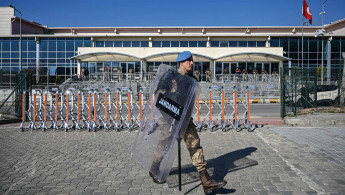Turkey to probe judges who acquitted Gezi protest defendants
Human rights organisations lauded the decision on Tuesday to acquit prominent philanthropist Osman Kavala and eight others in the controversial trial linked to the 2013 mass Gezi Park protests in Turkey.
Kavala was re-arrested just hours after being freed on seperate charges of involvement in a 2016 failed coup attempt, similarly described by rights defenders as "absurd".
The Council of Judges and Prosecutors - a body which conducts disciplinary procedures in the Turkish legal system - has since lauched an inquiry into the panel of judges who ordered the Gezi trial defendants' acquittal, state news agency Anadolu reported on Wednesday.
The Ankara-based council will probe whether there were "flaws" in the decision to acquit the defendants, while the Istanbul prosecutor has said he will appeal the decision which was made after the judges found there was not enough evidence.
The fresh detention of the trial's most prominent defendant Kavala has sparked condemnation from the European Union.
The philanthropist and civil society figure was accused of being the architect of the 2013 protests, and was on Tuesday re-arrested on charges of attempting to overthrow the constitutional order.
German Foreign Minister Heiko Maas said his renewed detention was "incomprehensible from every point of view".
Opposition activists have labelled the move as an attempt to keep Kavala in detention in perpetuity. The philanthropist was the only defendant to be kept in jail throughout the Gezi trial.
Soros accusations
|
|
Turkish President Recep Tayyip Erdogan condemned Kavala on Wednesday, denouncing attempts to acquit him.
The president emphasised his links to US billionaire and democracy activist George Soros, suggesting this proved he was seeking to undermine the government.
Erdogan has previously said Kavala was a Turkish agent of Soros, who he accused of trying to "divide and tear up nations".
Funding philanthropic projects across the world, Soros has become a favourite target of far-right extremists in many countries. Allegations that Soros attempts to control foreign affairs through his projects are widely considered to be anti-Semitic.
"There are Soros-like people behind the curtains who seek to stir up things by provoking revolt in some countries," Erdogan said.
"The Turkey branch of this was in prison, but they dared to acquit him," he added.
Kavala worked with Soros's Open Society Foundation before it was banned from Turkey, as well as a number of high-profile civil society groups.
The 2013 protest movement began with demonstrations in Istanbul, Turkey's largest city, against plans to transform one of the metropolis' last central green spaces into a shopping mall modeled off an Ottoman military barracks.
A harsh crackdown by the police and Erdogan's government prompted the scope of the protests to grow and target the government more generally.
During the protests, 22 people were killed and more than 8,000 injured.
The Council of Europe, a 47-nation body overseeing human rights of which Turkey is a member, published a report Wednesday calling for judicial independence to be restored after the state of emergency.
"The Turkish judiciary displays, especially in terrorism-related cases, unprecedented levels of disregard for even the most basic principles of law," it said.
Agencies contributed to this report
Follow us on Facebook, Twitter and Instagram to stay connected





 Follow the Middle East's top stories in English at The New Arab on Google News
Follow the Middle East's top stories in English at The New Arab on Google News


![22 Arab countries at COP29 have rejected the targeting of fossil fuels [Getty]](/sites/default/files/styles/image_330x185/public/2024-11/GettyImages-2184289638.jpg?h=199d8c1f&itok=ptHl5bec)